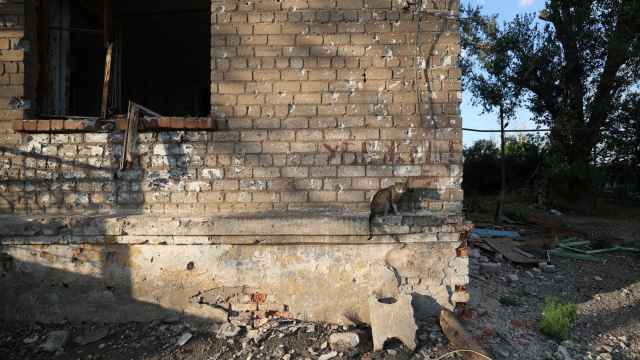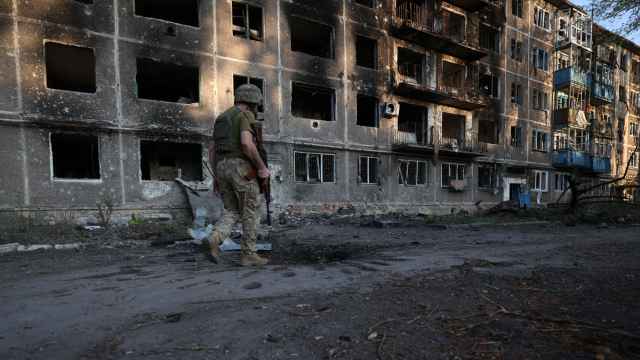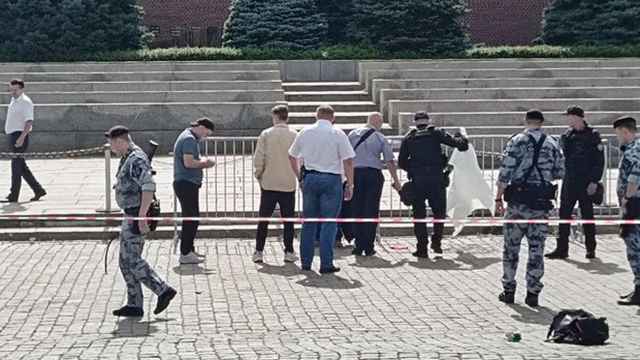European Union leaders sought Thursday to revive a stalled agreement with Ukraine after the former Soviet republic shocked the 28-country bloc last week by opting for closer ties with Russia in a geopolitical tug-of-war.
EU Council President Herman Van Rompuy and European Commission President Jose Manuel Barroso will meet with Ukrainian President Viktor Yanukovych hours before Thursday’s start of the Vilnius summit in an attempt to cajole him into signing the long-planned cooperation agreement as soon as possible.
On Friday, French President Francois Hollande and German Chancellor Angela Merkel were also planning to talk to the leader, who stunned the EU by suspending the deal that was supposed to offer the signature moment of the EU’s two-day Eastern Partnership summit.
Faced with pressure from Russia, Yanukovych shelved plans for closer ties with the EU last week. The move sparked protests at home and set back EU plans to pry a nation of 46 million people loose from Moscow’s orbit and push its geopolitical clout right up to Russia’s border. Instead, Moscow would like Kiev to join a separate union that aims to rival the EU.
Still, the EU has not given up and continues to laud the benefits of Ukraine having closer ties with the world’s biggest trading bloc, and has said the deal could be signed any time after the summit.
“The door is still open,” Swedish Prime Minister Fredrik Reinfeldt said.
Polish Foreign Minister Radoslaw Sikorski said Ukraine’s economic prospects would greatly improve if it signs the deal.
“The more you are willing and able to accept our assistance in modernizing your institutions, the more generous we are,” Sikorski said.
Ukraine remains careful not to burn anymore bridges with the EU at the summit.
“I am sure that the decision at tomorrow’s summit will be positive. We will find a solution,” Ukraine’s first deputy prime minister, Serhiy Arbuzov, said in a comment that may indicate that the suspension of the signature was not final.
While facing pressure from the EU, Yanukovych is grappling with discontent at home. Thousands of people have kept up daily protests in Ukraine’s capital against Yanukovych’s decision to drop further EU integration for closer ties with Russia. Popular mass protests in 2004, known as the Orange Revolution, brought down Yanukovych, and he is wary of a repeat of the same scenario now.
The protesters have been calling for the release of jailed former Prime Minister Yulia Tymoshenko.
The EU has made Tymoshenko, the political rival of Yanukovych, and an end to selective justice in Ukraine a condition for signing the Association Agreement.
But Tymoshenko herself has urged European leaders to ink the deal with Ukraine without linking it to her release.
Tymoshenko’s daughter Eugenia told The Associated Press in an interview in Vilnius that “it is not political prisoners who need to be saved now, but Ukraine needs to be saved.”
Analysts believe that Yanukovych is trying to play both sides, while attempting to secure a better short-term deal with Moscow.
A Message from The Moscow Times:
Dear readers,
We are facing unprecedented challenges. Russia's Prosecutor General's Office has designated The Moscow Times as an "undesirable" organization, criminalizing our work and putting our staff at risk of prosecution. This follows our earlier unjust labeling as a "foreign agent."
These actions are direct attempts to silence independent journalism in Russia. The authorities claim our work "discredits the decisions of the Russian leadership." We see things differently: we strive to provide accurate, unbiased reporting on Russia.
We, the journalists of The Moscow Times, refuse to be silenced. But to continue our work, we need your help.
Your support, no matter how small, makes a world of difference. If you can, please support us monthly starting from just $2. It's quick to set up, and every contribution makes a significant impact.
By supporting The Moscow Times, you're defending open, independent journalism in the face of repression. Thank you for standing with us.
Remind me later.






